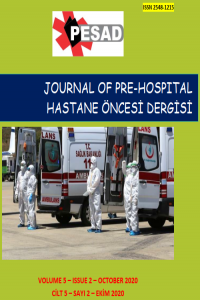112 SAĞLIK ÇALIŞANLARININ COVID-19 KORKU DÜZEYLERİNİN BELİRLENMESİ
Covid-19, korku, 112 sağlık çalışanı, Fear, 112 healthcare professionals
DETERMINING LEVELS OF FEAR OF COVID-19 IN 112 HEALTHCARE PROFESSIONALS
Covid-19, Fear, 112 Healthcare Professionals,
___
- References Adams, J.G., Walls, R.M. (2020). Supporting the Health Care Workforce During the COVID-19 Global Epidemic. JAMA. https://doi.org/10.1001/jama.2020.3972
- Ahorsu, D.K., Lin, C., Imani, V., Saffari, M., Griffiths, M.D., Pakpour, A.H. (2020). The fear of COVID-19 scale: Development and initial validation. Int J Ment Health Addict. https://doi.org/ 10.1007/s11469-020-00270-8
- Alexander, G.C, Wynia M.K. (2003). Ready and willing? Physicians' sense of preparedness for bioterrorism. Health Aff. 22 (5), 189-197.
- Ankaralı, H., Ankaralı, S., Erarslan, N. (2020). COVID-19, SARS-CoV2, Enfeksiyonu Güncel Epidemiyolojik Analiz ve Hastalık Seyrinin Modellemesi. Anadolu Klin. 25 (1), 1-22.
- Balicer, R.D., Omer, S.B., Barnett, D.J., Everly, G.S. (2006). Local public health workers' perceptions toward responding to an influenza pandemic. BMC Public Health. 6:99. doi:10.1186/1471-2458-6-99
- Chen, Q., Liang, M., Li, Y, et al. (2020). Mental health care for medical staff in China during the COVID-19 outbreak. Lancet Psychiatry. 7 (4), 15-16.
- Cowan, A., Clark, S.J., Kemper, A.R. (2005). Willingness of private physicians to be involved in smallpox preparedness and response activities. Biosecur Bioterror. 3 (1), 16-22.
- Du, J., Dong, L., Wang, T., Yuan, C., Fu, R., Zhang, L., Liu, B., Zhang, M., Yin Y., Qin, J., Bouey, J., Zhao, M., Li, X. (2020). Psychological symptoms among frontline healthcare workers during COVID-19 outbreak in Wuhan. Gen Hosp Psychiatry. doi:10.1016/j.genhosppsych.2020.03.011
- Ehrenstein, B., Hanses, F., Salzberger, B. (2006). Influenza pandemic and professional duty: Family or patients first? A survey of hospital employees. BMC Public Health. 6 (1), 311.
- Ferioli, M., Cisternino, C., Leo, V., Pisani, L., Palange, P., Nava, S., 2020. Protecting healthcare workers from SARS-CoV-2 infection: practical indications. Eur Respir Rev. 4; 29 (155), 200068.
- Gullion, J.S. (2004). School nurses as volunteers in a bioterrorism event. Biosecur Bioterror. 2 (2), 112-117.
- Haktanir, A., Seki, T., Dilmaç, B. (2020). Adaptation and evaluation of Turkish version of the fear of COVID-19 Scale. Death Stud. 1-9.
- Huang, J.Z., Han, M.F., Luo, T.D., Ren, A.K., Zhou, X.P. (2020) . Mental health survey of 230 medical staff in a tertiary infectious disease hospital for COVID-19. Zhonghua Lao Dong Wei Sheng Zhi Ye Bing Za Zhi. 38 (3), 192-195.
- Köksal, E., Dost, B., Terzi, Ö., Üstün, Y.B., Özdin, S., Bilgin, S. (2020). Evaluation of depression and anxiety levels and related factors among operating theatre workers during the novel Coronavirus (COVID-19) pandemic, J Perianesth Nurs. doi: https:// doi.org/10.1016/j.jopan.2020.06.017.
- Kushal, A., Gupta, S., Metha, M., Singh, M.M. (2018). Study of Stress among Health Care Professionals: A Systemic Review. Int J Res Foundation Hosp Healthcare Adm. 6, 6–11.
- Lai, J., Ma, S., Ma, Wang, Y., Cai, Z., Hu, J., Wei, N., Wu, J., Du, H., Chen, T., Li, R., Tan, H., Kang, L., Yao, L., Huang, M., Wang, H., Wang, G., Liu, Z., Hu, S. (2020). Factors associated with mental health outcomes among health care workers exposed to coronavirus disease. JAMA Netw Open. 3(3), e203976.
- Lanctôt, N., Guay, S. (2014). The aftermath of workplace violence among healthcare workers: A systematic literature review of the consequences. Aggress Violent Behav. 19 (5), 492-501.
- Li, Y., Wang, H., Jin, X.-R., Li, X., Pender, M., Song, C.-P., Tang, S.-L., Cao, J., Wu, H., Wang, Y.-G. (2018). Experiences and challenges in the health protection of medical teams in the Chinese Ebola treatment center, Liberia: a qualitative study. Infect Dis Poverty. 7 (1), 92.
- Liu, C.Y., Yang, Y.Z., Xu, X., Dou, Q.L., Zhang, W.W., Cheng, A.S.K. (2020). The prevalence and influencing factors in anxiety in medical workers fighting COVID-19 in China: a cross-sectional survey. Epidemiol Infect. 148 (98), 1-7.
- Mo, Y., Deng, L., Zhang, L., Lang, Q., Liao, C., Wang, N., Qin, M., Huang, H. (2020). Work stress among Chinese nurses to support Wuhan for fighting against the COVID-19 epidemic. J Nurs Manag. 28 (5), 1002–1009.
- Ovalı, F. (2020). Yenidoğanlarda COVID-19 Enfeksiyonları. Anadolu Klin. 25 (1), 23-35.
- Rahimi, A., Vazini, H., Alhani, F., Anoosheh, M., 2015. Relationship Between Low Back Pain With Quality of Life, Depression, Anxiety and Stress Among Emergency Medical Technicians. Trauma Mon. 20 (2), e18686. doi: 10.5812/traumamon.18686.
- Shigemura, J., Ursano, R.J., Morganstein, J.C., Kurosawa, M., Benedek, D.M. (2020). Public responses to the novel 2019 coronavirus (2019-nCoV) in Japan: mental health consequences and target populations. Psychiatry Clin Neurosci. 74 (4), 281-282.
- Temsah, M.-H., Al-Sohime, F., Alamro, N., Al-Eyadhy, A., Al-Hasan, K., Jamal, A., Al-Maglouth, I., Aljamaan, F., Amri, M.A., Barry, M., Al-Subaie, S., Somily, A.M. (2020). The psychological impact of COVID-19 pandemic on health care workers in a MERS-CoV endemic country. J Infect Public Health. 13 (2020), 877-882. doi:10.1016/j.jiph.2020.05.021
- Watt, K., Tippett, V.C., Raven, S.G., Jamrozik, K., Coory, M., Archer, F., Kelly, H.A. (2010). Attitudes to living and working in pandemic conditions among emergency prehospital medical care personnel. Prehosp Disaster Med. 25 (l), 13-1.
- Xiaoa, X., Zhua, X., Fua, S., Hub, Y., Lia, X., Xiaoa, J. (2020). Psychological impact of healthcare workers in China during COVID-19 pneumonia epidemic: A multi-center cross-sectional survey investigation. J Affect Disord. 274 (1), 405-410.
- Başlangıç: 2016
- Yayıncı: Paramedik Eğitiminde Standardizasyon ve Akreditasyon Derneği
COVID-19 FOBİSİ VE ENDİŞE ŞİDDETİ; MESLEK YÜKSEKOKULU ÖRNEĞİ
YAŞLI BİREYLERİN 112 ACİL SERVİSİ KULLANMA NEDENLERİNİN RETROSPEKTİF İNCELENMESİ
Gizem ÖZBUDAK, Dilek TAŞ, Ayfer KARADAKOVAN
TEHLİKELİ MADDE OLAYLARI RİSK YÖNETİMİNDE ACİL ÇAĞRI MERKEZLERİNİN ROLÜ
COVID-19 PANDEMİSİNİN HASTANE ÖNCESİ ACİL SAĞLIK ÇALIŞANI ÜZERİNE ETKİSİ
Tuğba AKGÜN, Sibel KARACA SİVRİKAYA
İshak ŞAN, Günseli UZUNHASANOĞLU, Birgül ÖZKAN
KRONİK HASTALIĞA SAHİP BİREYLERİN AFETLERDE ZARAR GÖREBİLİRLİĞİ
Gülseren AYDOĞMUŞ ATALAY, Özlem ÇAKIR
112 SAĞLIK ÇALIŞANLARININ COVID-19 KORKU DÜZEYLERİNİN BELİRLENMESİ
Sevinç YAŞAR CAN, Behiye DİLMEN BAYAR
KRİTİK DURUMDAKİ COVID-19 HASTASININ TRANSPORTU
Pınar TUNÇ TUNA, Alev YILDIRIM KESKİN, Birsel MOLU, Halil İbrahim TUNA
